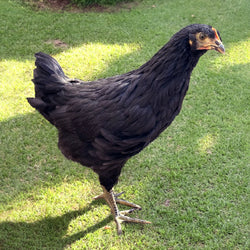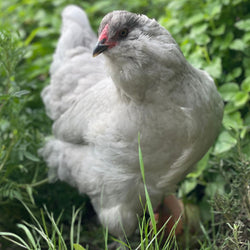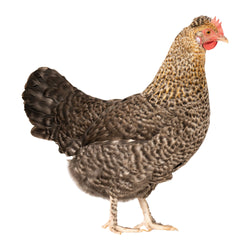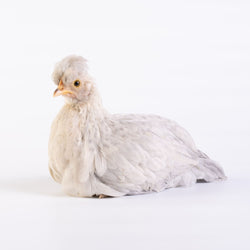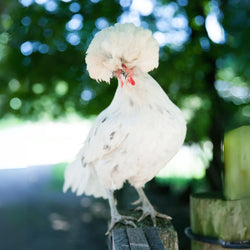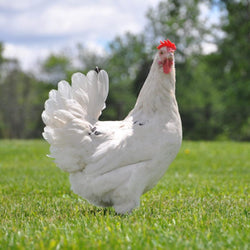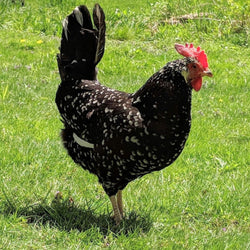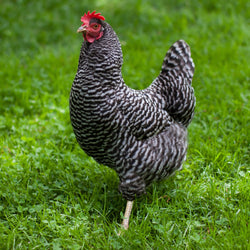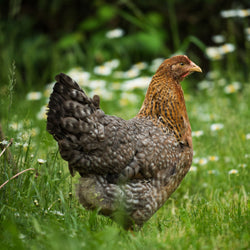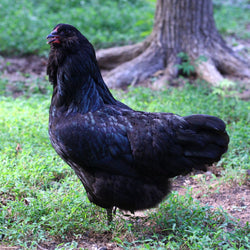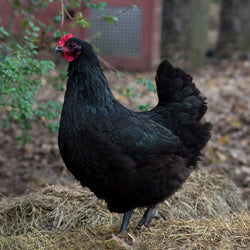page=8/--
Frequently Asked Questions
Here we answer the most commonly-asked questions about ordering, chicken care, and more.
How do I start my own small hatchery business from my home?
That's a complex question. If you would like to turn your home or farm into a hatchery and begin selling baby chicks to other people, we'd first recommend getting NPIP certification so you can be sure that your chicks are free of the worst diseases passed from hen to chick through the egg. We also recommend learning about biosecurity, so you can be sure your breeding flocks will remain clean. You want to be assured you're selling healthy birds to your customers. The next thing you might consider is to join one or more breed clubs for the breeds you'd...
Read MoreAre the color of a hen's eggs determined by the color of her earlobes?
Not exactly, although ear lobe color seems to be related to egg color most of the time. Breeds with white earlobes usually lay white eggs... except for Penedesencas and Empordanesas, which have white earlobes and lay dark chocolate colored eggs. Chickens with red earlobes usually lay eggs in shades of brown... except for breeds and varieties like Easter Eggers, Ameraucanas, and Araucanas, which lay blue or green eggs. Then there is the Silkie. The hens lay light brown or nearly white eggs, while their earlobes are blue. Check out my lobes! So ear lobe color is often related to---but not...
Read MoreWhen will my chickens begin laying again in the spring?
Some chicken breeds lay year round (save when they go broody). One of our employees who's at a mid-latitude in the US reports that any girls who stop laying during the winter begin again regularly--and surprisingly precisely--on February 1 or 2, about halfway between the winter solstice and the spring equinox. If you live in an area where day length doesn't change much, your chickens may begin laying sooner (or never stop). If you live in an area where winter days are very short and cold, they may begin laying again later in the year. While it's the increasing light...
Read MoreWhy do my hens stop or almost stop laying in the late fall and winter months?
A chicken's reproductive cycle begins with her eyes, or possibly in her skull or even her skin, as one NC State extension article stated: The major environmental cue for control of reproduction is day length. Reception of light for reproductive purposes by the pullet is not primarily through the eyes but rather by the light energy penetrating the skull, skin and feathers and then perceived by an organ within the brain. My brain, you say? Light cues tell your chicken's body whether to release a yolk from her ovaries that will be turned into an egg. Even if the winter...
Read MoreIs it true that modern, purebred chickens can't hatch their own eggs?
No, that's not true. First, broodiness is not tied to whether a chicken is purebred or not. Broodiness depends more on a chicken's breed, her genetic background. For instance, Rhode Island Reds very seldom go broody. Leghorns and other Mediterranean breeds are very unlikely to go broody, too, because not going broody very often is just a characteristic of those breeds. Other breeds may go broody very frequently--too frequently, some people find! For instance, orpingtons and silkies often seem to be broody most of the time. Second, as for "modern" breeds being less likely to brood, that's not true, either....
Read MoreWhat is the nutritional difference between the eggs I can get at a grocery store and eggs my hens lay at home?
Wouldn't it be nice if you could get such good eggs in the grocery store? Until things change, though, most people really can't. Studies show that eggs laid by hens raised on pasture--in other words, hens who have access to a yard or run where they can forage--have less fat and cholesterol, and more healthy vitamin A, vitamin E, beta carotene and omega-3s. A follow-up study confirms the findings, and shows additionally that pastured hens also lay eggs with increased vitamin D--three to six times more! By contrast, eggs you get in the grocery store are typically laid by hens...
Read MoreWhat treats taste best to chickens?
Chickens LOVE treats, and they have their own individual tastes and preferences, of course. But we hate to break it to you: they have almost no taste buds, so their preferences are probably not based primarily on fine taste nuances. Humans have around 10,000 taste buds, while chickens have a maximum of only around 350 taste buds. They don't have any receptors for capsaicin (spiciness), and have a good tolerance for sour, although they're attracted to neither bitter nor sweet nor salty. And in fact, the taste buds of a chicken are located so far back on the tongue that...
Read MoreHow can I tell if my hens' eggs are fertile?
Crack a fresh, unincubated egg into a bowl in good light. If you have sharp eyes, you will see that a fertile egg has a faint bullseye, the fertilized blastoDERM, on the yolk, while for an infertile egg, it will just be an irregular spot, a blastoDISC. If you don't have sharp eyes you might make use of a magnifying glass--or ask someone to help. Remember to check the bottom of the yolk; sometimes the way your egg lands in your dish will make the bullseye difficult to see. Illustration by Ray Yang for My Pet Chicken There's a problem,...
Read More







"The Clubhouse" Coop
Easy to assemble and built to last, the Clubhouse Coop is the perfect starter coop for a small flock.
